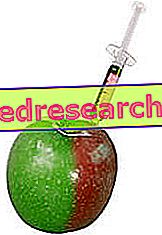Related articles: Kidney stones
Definition
Kidney stones are solid concretions that form in the urinary system. These "pebbles" can cause pain in the lumbar region, abdominal colic, nausea, vomiting and hematuria; sometimes they can obstruct the ureter, obstructing the normal flow of urine from the kidneys to the bladder; this may favor the development of pyelonephritis and secondary infections.
Kidney stones result from the precipitation and aggregation of some substances present in the urine in a state of hypersaturation (such as phosphates, oxalates, calcium, uric acid and cystine). Over time, the stones pass from the kidney to the ureter, then to the bladder, to then be expelled.
In physiological conditions, the formation of stones does not occur due to the presence in the urine of substances, such as citrate, which bind salts and other elements in soluble complexes, preventing their precipitation and crystallization. Unfortunately, these mechanisms do not always guarantee completely effective protection.
The most important risk factors for calculus formation include urine supersaturation of a solute (eg hypercalciuria and hyperoxaluria) and urinary pH changes, which can promote crystallization (secondary, for example, to urinary tract infections promote alkalinization of urine). Also the reduced levels or the absence of urinary inhibitors of stone formation favor the disorder (eg hypocitraturia).
The presence of urinary tract infections caused by urease-producing bacteria (eg Proteus spp. ) Can lead to the formation of magnesium and ammonium phosphate (struvite) stones.
Risk factors are also anatomical anomalies - such as pyelocaliceal diverticula and horseshoe kidney - or conditions that slow down the urinary outflow, as often happens in prostate pathologies.
The formation of kidney stones is also favored by an unbalanced diet (eg high intake of protein and sodium). Among the major promoters of kidney stones is dehydration, resulting in poor fluid intake or special conditions that remove liquids from the body, such as chronic diarrhea or heavy sweating. Furthermore, a great deal of importance is given to family predisposition: those who have cases in their family of kidney stones are more at risk.
Also the use of some drugs, such as, for example, acetazolamide (antihypertensive) can cause kidney stones by increasing urinary pH and urinary excretion.
Kidney stones are also observed in the context of hyperuricemia in patients with gout or with malignant haematological disease.
Other causes include renal tubular acidosis, hypercalcemia (increases the renal calcium filtrate load) and cystinuria (an autosomal defect in the transport of cystine, ornithine, lysine and arginine in the kidney and intestines).
Other predisposing conditions are some metabolic disorders, among which we recall hyperthyroidism and primitive hyperparathyroidism, which affect the bone tissue by increasing calcium mobilization. Rare causes are sarcoidosis, vitamin D intoxication, multiple myeloma, metastatic tumors and various diseases of the abdominal organs (eg pancreatitis or chronic biliary disorders).

The symptoms of kidney stones cannot be hidden due to the intensity of the pain
Possible Causes * of Kidney Stones
- Gouty Arthritis
- Primary biliary cirrhosis
- cystinuria
- Gout
- Kidney failure
- Hyperparathyroidism
- Hyperthyroidism
- Leukemia
- lymphoma
- Multiple myeloma
- Cushing's disease
- Paget's disease
- Osteoporosis
- Pancreatitis
- pyelonephritis
- Fanconi syndrome
- Sjögren syndrome
- Kidney tumor
- Neurological bladder



